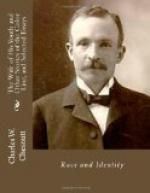At eight o’clock the ballroom was a blaze of light and the guests had begun to assemble; for there was a literary programme and some routine business of the society to be gone through with before the dancing. A black servant in evening dress waited at the door and directed the guests to the dressing-rooms.
The occasion was long memorable among the colored people of the city; not alone for the dress and display, but for the high average of intelligence and culture that distinguished the gathering as a whole. There were a number of school-teachers, several young doctors, three or four lawyers, some professional singers, an editor, a lieutenant in the United States army spending his furlough in the city, and others in various polite callings; these were colored, though most of them would not have attracted even a casual glance because of any marked difference from white people. Most of the ladies were in evening costume, and dress coats and dancing pumps were the rule among the men. A band of string music, stationed in an alcove behind a row of palms, played popular airs while the guests were gathering.
The dancing began at half past nine. At eleven o’clock supper was served. Mr. Ryder had left the ballroom some little time before the intermission, but reappeared at the supper-table. The spread was worthy of the occasion, and the guests did full justice to it. When the coffee had been served, the toast-master, Mr. Solomon Sadler, rapped for order. He made a brief introductory speech, complimenting host and guests, and then presented in their order the toasts of the evening. They were responded to with a very fair display of after-dinner wit.
“The last toast,” said the toast-master, when he reached the end of the list, “is one which must appeal to us all. There is no one of us of the sterner sex who is not at some time dependent upon woman,—in infancy for protection, in manhood for companionship, in old age for care and comforting. Our good host has been trying to live alone, but the fair faces I see around me to-night prove that he too is largely dependent upon the gentler sex for most that makes life worth living,—the society and love of friends,—and rumor is at fault if he does not soon yield entire subjection to one of them. Mr. Ryder will now respond to the toast,—The Ladies.”
There was a pensive look in Mr. Ryder’s eyes as he took the floor and adjusted his eyeglasses. He began by speaking of woman as the gift of Heaven to man, and after some general observations on the relations of the sexes he said: “But perhaps the quality which most distinguishes woman is her fidelity and devotion to those she loves. History is full of examples, but has recorded none more striking than one which only to-day came under my notice.”
He then related, simply but effectively, the story told by his visitor of the afternoon. He gave it in the same soft dialect, which came readily to his lips, while the company listened attentively and sympathetically. For the story had awakened a responsive thrill in many hearts. There were some present who had seen, and others who had heard their fathers and grandfathers tell, the wrongs and sufferings of this past generation, and all of them still felt, in their darker moments, the shadow hanging over them. Mr. Ryder went on:——




